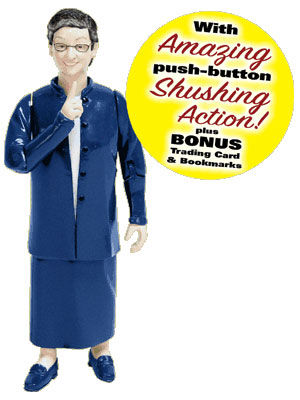Competency #13
Demonstrate oral and written communication skills necessary for group work, collaborations and professional level presentations

Nancy Pearl Action Figure. Advertisement: cafepress.com
It’s ironic that the most iconic image of a librarian represents an end to communication. Although I must admit I do love a quiet reading space in the library, in the professional space a competent librarian must be prepared to speak out. Many of the other competencies call for an examination of communication between librarian and information seeker, which is indeed a type of collaboration, but Competency #13 is focused on the kind of communication necessary among coworkers and professionals. In fact, there is nothing specific to library work about this competency— “oral and written communication skills necessary for group work, collaborations and professional level presentations” are requirements for virtually all working professionals.
In the SLIS program I have learned some specific truths about collaborative work, especially distance work in a digital environment. This knowledge has been an excellent addition to my existing skills, most of which I have developed through my employment as a teacher. One component of effective group communication I have learned through error is the necessity of having firm agreements about individual responsibilities for a group project, and then politely but definitely holding associates to the agreement. It has been my experience that many teachers and librarians have in common a reluctance to be assertive with others in collaborative efforts, preferring instead to perform the neglected work themselves. In fact, I still have this tendency, but I work on strengthening my competency in this area, since I now realize that if I won’t require, I can’t complain. I do think that the dynamics of working in a ‘virtual’ group are more complex than those encountered in face-to-face practice. People find it easier to evade responsibility and the resulting confrontation, and the aggrieved definitely are emboldened by digital distance, sometimes expressing anger or disappointment far more vehemently than they would ever do in the workplace. Through observation I have learned that a competent communicator should never use email to say something he would not say in person. Since virtual collaboration is sure to continue to increase in business, professionals of all types must become more aware of its particular challenges and increasingly expert in its effective use.
In my teaching work as a Speech and Debate coach, department chair, committee leader, and teacher’s union negotiator and president, I have had many opportunities to learn about communication through group work and collaborative projects with peers. When I am successful in communicating or when, as an audience member, I judge the speaker to be effective, I observe that several traits are invariably present. As a speaker or writer, a competent communicator values her audience. That means she is well prepared. She is concise; her writing is clear. In both formats the intelligence of the audience is respected in the content. A professional who communicates well understands the importance of rhetorical devices where appropriate, persuading through use of humor, supporting points with data, using acceptable emotional appeal. The form of these devices will vary greatly depending on whether the speaking or writing occurs in casual meetings or polished presentations, but the elements remain the same.
The paper I display as my first piece of evidence was not written as a presentation, but because I am proud of the writing it contains I offer it as an example of my ability to write at a professional level. It was written for Libr 265, Young Adult Literature. The assignment was a biography of a major author of children’s literature and an overview of the author’s work and influence. The essay shows my ability to distill a large quantity of information into a focused, well-structured final product which offers a complex biographical and literary analysis in a clear and even entertaining format.
I also offer a basic brief essay application I was required to submit before participating in the state-wide Beginning Teacher Support and Assessment program. I was pleased that I was able to communicate my attitudes and qualifications effectively within the word limit imposed. The application was successful; I was chosen as a mentor teacher.
As evidence of my competence in creating professional and collaborative written work, I have created a document which contains an assortment of material I wrote as head negotiator for my local teachers’ union. Included are both emails discussing proposed contract issues and contract language I crafted which was eventually ratified, a goal also achieved through effective public and private speech.
A slightly unusual piece of evidence definitely displays my mastery of oral communication to a professional standard: on the third page of this National Forensic League program is the record of my first ‘Diamond Award’ for continued success in coaching competitive public speaking and debate.
